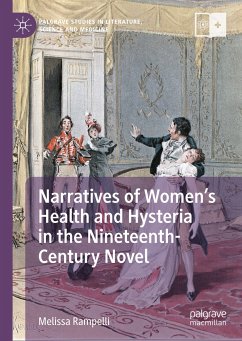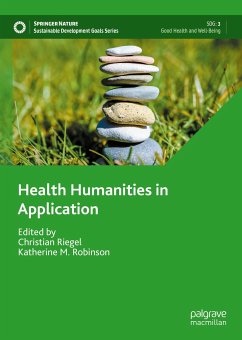
Envisioning Embodiment in the Health Humanities (eBook, PDF)
Interdisciplinary Approaches to Literature, Culture, and Media
Redaktion: Cressman, Jodi; Martin Peterson, Nora; Ludlow, Jeannie; Detora, Lisa
Versandkostenfrei!
Sofort per Download lieferbar
104,95 €
inkl. MwSt.
Weitere Ausgaben:

PAYBACK Punkte
52 °P sammeln!
Envisioning Embodiment in the Health Humanities: Literature, Culture, and Media examines discourses of embodiment across disability studies, gender studies, cultural studies, and visual studies to inform educational practice as well as cultural criticism related to the health and medical humanities. The book argues that imagery and other visual elements in literature, comics, lived experience and the arts demonstrate the hybridity of the embodied experience and identity and have something to offer to clinical practice. Connected to the UN Sustainable Development Goals 3 (Health), 4 (Gender equ...
Envisioning Embodiment in the Health Humanities: Literature, Culture, and Media examines discourses of embodiment across disability studies, gender studies, cultural studies, and visual studies to inform educational practice as well as cultural criticism related to the health and medical humanities. The book argues that imagery and other visual elements in literature, comics, lived experience and the arts demonstrate the hybridity of the embodied experience and identity and have something to offer to clinical practice. Connected to the UN Sustainable Development Goals 3 (Health), 4 (Gender equality), and 16 (Strong institutions), the topics addressed in the essays include mental health, grief, COVID-19, healthcare practices, cancer, and women's health. The volume is designed to be accessible to advanced undergraduate students as well as graduate students and to be useful for medical practitioners and others who are interested in the health humanities, disability studies,gender studies, or cultural studies.
Dieser Download kann aus rechtlichen Gründen nur mit Rechnungsadresse in A, B, BG, CY, CZ, D, DK, EW, E, FIN, F, GR, HR, H, IRL, I, LT, L, LR, M, NL, PL, P, R, S, SLO, SK ausgeliefert werden.












